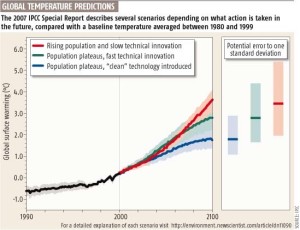By Penny Paugh
There are many factors that affect the global temperature of the planet, including the rise and fall of greenhouse gases, solar activity, light-scattering atmospheric pollutants, heat transfer among the land, sea, and air, and the presence or absence of forests to process carbon dioxide.

An example of a simple report on scenarios of global warming, produced by the Intergovernmental Panel on Climate Change (IPCC). Image reproduced from NewScientist.
Researchers at the University of Oxford tweaked three parameters in a model: changes in the concentration of carbon dioxide in the atmosphere, the rate at which oceans absorb heat from the atmosphere, and the amount of cooling from light-scattering aerosols in the atmosphere. The team analyzed the results of thousands of climate simulations, each of which had a slightly different combination of parameters, covering the years 1920 to 2080. Simulations were narrowed to those that imitated observed results in more than 20 land areas and ocean basins from 1960 to today.
Each run allowed for variations in solar activity (which would affect how much the sun’s radiation warms Earth) and rates of volcanic activity (which would influence the concentrations of planet-cooling sulfate aerosols in the atmosphere).
Two-thirds of the simulations that best matched previous climate observations suggest that global average temperature in 2050 will be between 1.4°C and 3°C warmer than the global average measured between 1961 and 1990.
Isaac Held, a climate scientist with the National Oceanic and Atmospheric Administration, stated that the team’s set of simulations offered a valuable resource for further analysis of climate change. Eventually, he suggested in a commentary in Nature Geoscience, results of the new study may help scientists not only quantify the uncertainty in climate analyses but also reduce it.
Reference
Perkins, S. “Earth Warming Faster Than Expected,” Science, March 25, 2011, retrieved from http://news.sciencemag.org/sciencenow/2012/03/earth-warming-faster-than-expected.html.

Comments are closed.